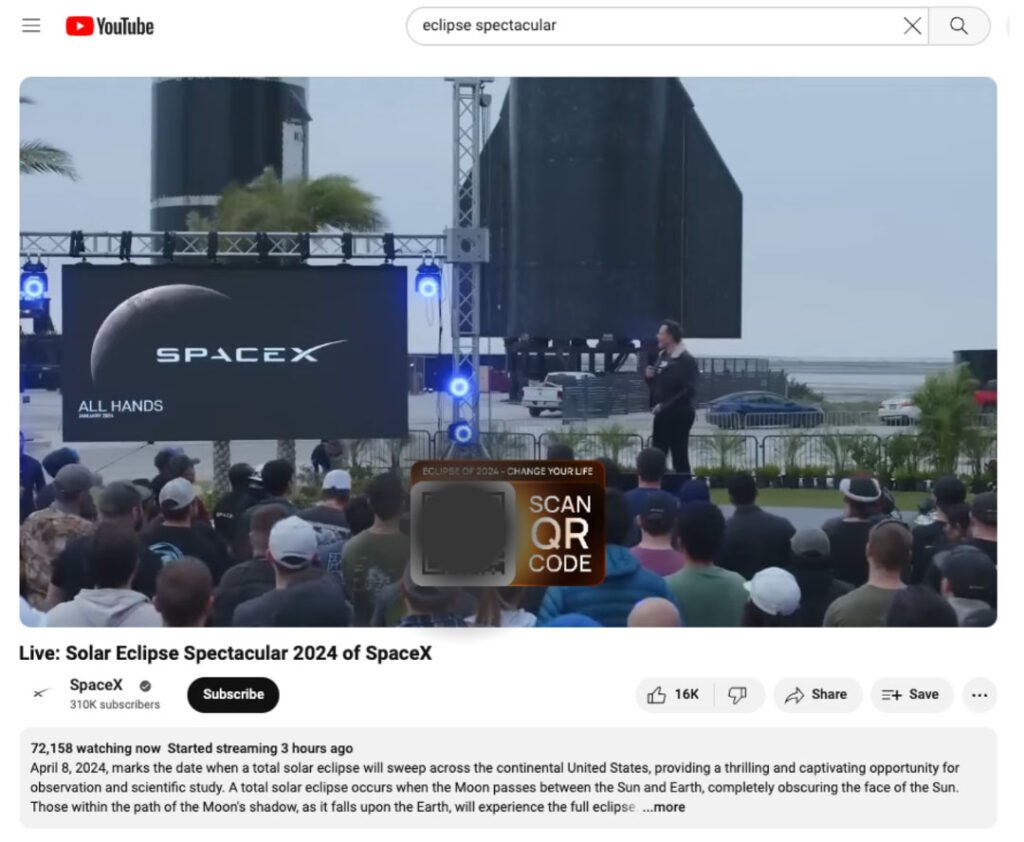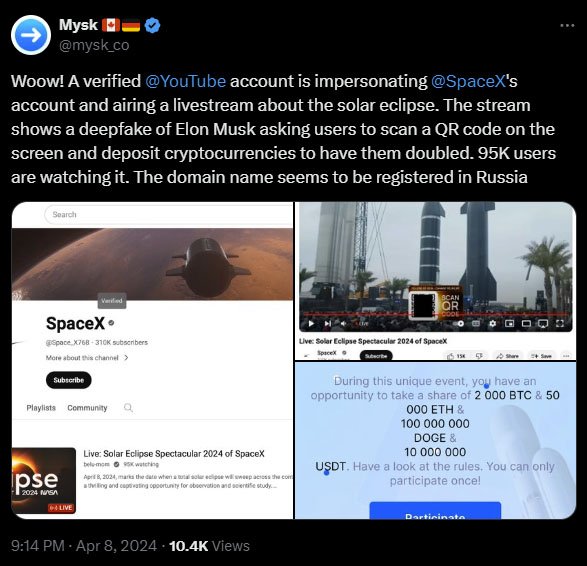The Elon Musk Bitcoin scams have evolved from text-based cons to sophisticated AI deepfakes and QR codes highlighting a worrying trend in digital fraud. Scammers, using the credibility of figures and companies like SpaceX, target a wide audience, from Bitcoin enthusiasts to newcomers.
From Text And Links To AI Deepfakes And QR Codes
Scams on social networks like X/Twitter have undergone significant evolution. Initially, these scams primarily relied on text and links to deceive users. Simple messages promising unrealistic returns for small investments or participation in giveaways could direct users to fraudulent websites through clickable links embedded within tweets or posts.

BBC News reported that a man lost 10 bitcoin, valued at nearly half a million dollars at the time the article was published, due to a classic Twitter scam.
“Sebastian will always remember the moment he lost £407,000, with equal parts anger and shame.”
–Source
The advent and proliferation of deepfake technology have further advanced the sophistication of scams on social networks. Deepfakes—highly realistic and convincing digital manipulations of video and audio—enable scammers to create content that appears to feature public figures or celebrities endorsing or promoting seemingly legitimate investment opportunities, including in bitcoin and other digital assets. These deepfakes can be particularly convincing, leveraging the trust and authority of well-known personalities to lure victims into scams.
Choosing The Actors

Elon Musk has frequently been the subject of fake bitcoin giveaway scams. These scams often use social media platforms, including Twitter, YouTube, and others, to spread misinformation. Scammers create fake accounts or hack into legitimate ones, posing as celebrities or high-profile figures like Musk, to promote these scams. They promise to multiply the bitcoin people send them as part of the giveaway. Once the bitcoin is sent to the scammer’s address, the victim receives nothing in return.
This type of scam leverages the popularity and influence of figures like Musk to appear more credible. The scammers often use sophisticated methods to make their operations seem legitimate, including fake endorsements, cloned websites, and social media accounts that closely mimic those of the person they’re impersonating. They may also use other tactics like manipulating comments or engagement metrics to push their scam messages to the forefront of platforms, where more people will likely see them.
Choosing The Targets
The target audience for bitcoin giveaway scams is broad but can generally be categorized into a few key groups:
- Bitcoin Enthusiasts and Investors: Individuals who are already interested in or are investing in Bitcoin and other digital currencies are prime targets. These individuals are likely to have some knowledge of the digital assets market and may be enticed by the opportunity to receive more bitcoin, especially when it appears to be endorsed by a successful entrepreneur like Musk.
- Fans and Followers of the Impersonated Figures: Fans of Elon Musk, for example, might be more inclined to trust a giveaway that appears to be associated with him. Scammers exploit people’s trust and admiration for such figures to lend credibility to their schemes.
- Newcomers to the Bitcoin Space: Those new to Bitcoin might be less aware of the prevalence of scams in the space. New investors might not yet have the experience to recognize the red flags that accompany such fraudulent schemes.
- Individuals Looking for Quick Financial Gains: People who are in search of quick and easy ways to increase their wealth can be particularly vulnerable. The promise of fast returns with minimal effort is a common lure used in scams across various industries.
Most Recent Elon Musk Bitcoin Giveaway: The Solar Eclipse
“ ‘Live: Solar Eclipse Spectacular 2024 of SpaceX’ reads the title of another livestream, which has been attracting tens of thousands of views at any given time. At one point, that stream hit nearly 100,000 concurrent views.”
–Source


“Scammers create and distribute videos making it seem Musk is endorsing a Bitcoin giveaway.
The deepfakes show Musk instructing viewers to use a promo code like “MUSK” on a recommended crypto exchange site to claim free Bitcoin. But the platforms are completely fake, designed to steal deposits.”
–Source
Related reading: Everyone’s a Scammer
How To Avoid Scams?
Here’s how you can protect yourself from such scams:
- Verify through official channels: Always check SpaceX’s official website and verified social media accounts for any announcements regarding events.
- Be skeptical of urgency: Scammers often create a false sense of urgency to rush people into making decisions without thinking critically.
- Look for red flags: Poor spelling, grammatical errors, and requests for personal information or payments are all warning signs.










